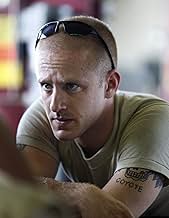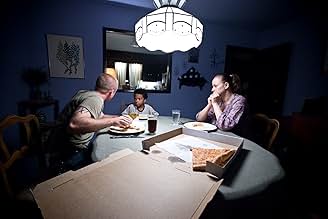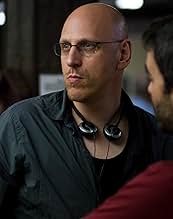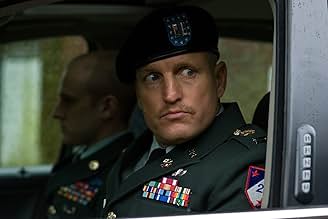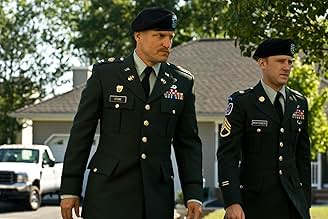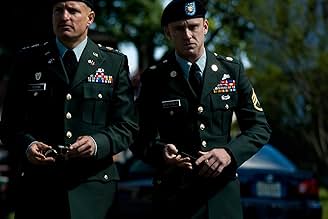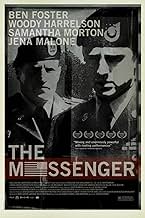IMDb-BEWERTUNG
7,1/10
37.715
IHRE BEWERTUNG
Füge eine Handlung in deiner Sprache hinzuAn American soldier struggles with an ethical dilemma when he becomes involved with a widow of a fallen officer.An American soldier struggles with an ethical dilemma when he becomes involved with a widow of a fallen officer.An American soldier struggles with an ethical dilemma when he becomes involved with a widow of a fallen officer.
- Regie
- Drehbuch
- Hauptbesetzung
- Für 2 Oscars nominiert
- 17 Gewinne & 47 Nominierungen insgesamt
Brian Adam DeJesus
- Teenager #1
- (as Brian DeJesus)
Empfohlene Bewertungen
The Messenger is being overshadowed by other war films like The Hurt Locker, yet it is different and a great film. It has a very slow pace, but it has some incredibly powerful scenes and some amazing acting. Woody Harrelson is getting Oscar buzz for his performance, and he does deserve it. He has had a great year, with this and Zombieland. As great as he was, though, Ben Foster is just as great. Samantha Morton is probably better than both because she possesses a subtle and powerful gesture that only she has. I have only seen her in one other film, Synecdoche, New York, and she plays completely different types of personalities in both. Here, she is very quiet, but she is able to portray the reason why Foster's character is intrigued by her. The job that Stone and Montgomery (Foster and Harrelson) have is very difficult to do, and this is the first film to portray a job like that that I have seen. The director and writer did a great job. One of the flaws is that by the ending the film has no real directional focus, and this is a flaw in the screenplay. However, still a great film that should be seen not just for Harrelson but for the entire cast. Don't let the subject matter turn you away
10dzlz105
I will not reiterate the plot of The Messenger; it has been done exhaustively already. The relevant facts, to me, are: This movie is a work of art in which the intentions of the director, writer, cinematographer and actors are all united. The actors, especially leads Ben Foster, Woody Harrelson and Samantha Morton, give subtle, nuanced performances. The plot is not cookie-cutter; you cannot guess what is going to happen at every turn. It is serious at its core but is not devoid of humor.
Lately, I have been happier with the older movies I see on cable than the movies showing in theaters. This is the exception.
Lately, I have been happier with the older movies I see on cable than the movies showing in theaters. This is the exception.
THE MESSENGER is by far and away one of the best works of art that addresses the deep tragedy behind the current U.S. war in the Middle East that I've seen. THE MESSENGER is an attempt by Director Oren Moverman and screen writer Alessandro Camon to place themselves between the ears of two career soldiers who serve a vital place in U.S. Army Special Services, Casualty Notification teams who inform the families of soldiers that their family member has been killed in battle. As someone who remembers full well the devastating feeling you got in your insides when you saw these teams turn up at the quarters of friends and their families when my own father was serving in Vietnam in the late 1960s, I found the film an important effort.
Staff Sergeant Will Montgomery (Ben Foster) is a Iraqi war veteran recovering from a battlefield wound who is reassigned to a State Department and United States Army Casualty Notification team, which is led by Captain Tony Stone (Woody Harrelson). Montgomery is also facing an impending breakup with his girlfriend Kelly (Jena Malone), who is playing him off against a wealthy, established suitor. When he is assigned to Stone's team, he is at first resentful. The military decorum which is demanded of the Casualty Notification Team is very exacting, with learned routines that come from a spit and polish military professionalism that requires a distance that is extremely difficult to attain.
What follows is a series of well connected vignettes, in which the younger soldier is asked to stride this nether world between the jaundiced, dry-drunk outlook of the seasoned bearer of bad news, Captain Stone. Stone is a bitter man with some frustrated ambitions of his own, which are revealed late in the film. Obsessed with sexual victories and teeter tottering between professional sobriety and complete emotional collapse, Stone is far from a steady colleague mentor. Encounters between he and Montgomery go into emotional roller coaster as each man learns to accept the other on his own terms while acting out an extremely trying professional military role.
In short time, Montgomery comes into contact with the widow of a soldier who sparks his interest, and becomes torn between professionalism and attraction to the young widow Olivia Pitterson (Samantha Morton). Montgomery is forced to grow into himself, despite his outward cynicism, and in short time begins to mentor his mentor, Captain Stone. The story has an open ending, with Montgomery seeking to be part of the life of widow Olivia as she is seeking to reestablish herself in New Orleans. No morals are offered, and this is the true strength of the work as a whole. There isn't much humor to be found here, but watch for the scene where a bender fried Montgomery and Stone attend the wedding reception of the woman who has broken Montgomery's heart. The lampoon of upper middle class phoniness is priceless.
The beauty of THE MESSENGER is that it does not fall into the usual pro war or antiwar camps that film making in an era like our own are usually so encumbered with. The film makers are ambitious and restrained. I have no idea whether the plot line is itself "contrived" as some here have argued, which I have to say is a rather ridiculous critique given that movies are rarely anything but "contrived", and this is particularly true of the genre we call the war film. Some who have written here seem to believe that the film discredits the "professionalism" of those who do the work of Stone and Montgomery, as though "professionalism" were itself some sort of fetish that protects one from emotional or mental illness generated by both war time trauma and the mystique of military culture. Such are the times in which we live, ideological blather is rampant.
THE MESSENGER is important because, in the words of that great Vietnam war era politician, the late President Lyndon Baines Johnson, it is art, it shows us who we are, not who we say we are, not who we think we are, but who we are as a people, and as a political culture. At various moments, it is clunky. But it is an early effort to give some true definition about what the debacle in Iraq has done to our culture, and to the people who are expected to do the dirty work of the empire's war machine. It is a rare gem in mainstream contemporary U.S. film making.
Staff Sergeant Will Montgomery (Ben Foster) is a Iraqi war veteran recovering from a battlefield wound who is reassigned to a State Department and United States Army Casualty Notification team, which is led by Captain Tony Stone (Woody Harrelson). Montgomery is also facing an impending breakup with his girlfriend Kelly (Jena Malone), who is playing him off against a wealthy, established suitor. When he is assigned to Stone's team, he is at first resentful. The military decorum which is demanded of the Casualty Notification Team is very exacting, with learned routines that come from a spit and polish military professionalism that requires a distance that is extremely difficult to attain.
What follows is a series of well connected vignettes, in which the younger soldier is asked to stride this nether world between the jaundiced, dry-drunk outlook of the seasoned bearer of bad news, Captain Stone. Stone is a bitter man with some frustrated ambitions of his own, which are revealed late in the film. Obsessed with sexual victories and teeter tottering between professional sobriety and complete emotional collapse, Stone is far from a steady colleague mentor. Encounters between he and Montgomery go into emotional roller coaster as each man learns to accept the other on his own terms while acting out an extremely trying professional military role.
In short time, Montgomery comes into contact with the widow of a soldier who sparks his interest, and becomes torn between professionalism and attraction to the young widow Olivia Pitterson (Samantha Morton). Montgomery is forced to grow into himself, despite his outward cynicism, and in short time begins to mentor his mentor, Captain Stone. The story has an open ending, with Montgomery seeking to be part of the life of widow Olivia as she is seeking to reestablish herself in New Orleans. No morals are offered, and this is the true strength of the work as a whole. There isn't much humor to be found here, but watch for the scene where a bender fried Montgomery and Stone attend the wedding reception of the woman who has broken Montgomery's heart. The lampoon of upper middle class phoniness is priceless.
The beauty of THE MESSENGER is that it does not fall into the usual pro war or antiwar camps that film making in an era like our own are usually so encumbered with. The film makers are ambitious and restrained. I have no idea whether the plot line is itself "contrived" as some here have argued, which I have to say is a rather ridiculous critique given that movies are rarely anything but "contrived", and this is particularly true of the genre we call the war film. Some who have written here seem to believe that the film discredits the "professionalism" of those who do the work of Stone and Montgomery, as though "professionalism" were itself some sort of fetish that protects one from emotional or mental illness generated by both war time trauma and the mystique of military culture. Such are the times in which we live, ideological blather is rampant.
THE MESSENGER is important because, in the words of that great Vietnam war era politician, the late President Lyndon Baines Johnson, it is art, it shows us who we are, not who we say we are, not who we think we are, but who we are as a people, and as a political culture. At various moments, it is clunky. But it is an early effort to give some true definition about what the debacle in Iraq has done to our culture, and to the people who are expected to do the dirty work of the empire's war machine. It is a rare gem in mainstream contemporary U.S. film making.
After countless inert and strangely uninvolving films that have been released over the last few years and have used the war on terror as a backdrop for their action ("Jarhead," "Rendition," "Stop-Loss," more I can't even recall at the moment), 2009 produced two films that finally feel plugged directly into the tone the war has taken in our culture -- one of wearying sadness.
One of those films was "The Hurt Locker," and the other is "The Messenger," Oren Moverman's somber and haunting story about a troubled soldier back from the front lines who's assigned the task of notifying people about the deaths of their loved ones in the conflict. I can't vouch for the accuracy of either film, but I can say that both communicate the same emotions I feel when I see or hear first-hand accounts about what's going on overseas. I'm not enraged or galvanized into either pro or con positions -- I'm simply depressed by the meandering, pointlessness of it all and the human waste.
The acting trio of Ben Foster, Woody Harrelson, as Foster's instructor in how to be a harbinger of death and especially Samantha Morton, as the widow of one of the dead with whom Foster strikes up a romance of sorts, are formidable, and the film feels authentic in its settings and in the people who populate them. If you had to label the film one way or another, you would definitely have to come down on the side of anti-war. But it's really too resigned and matter-of-fact for that label to fit, and that's what I like about it. It almost seems to be saying that being anti-war is beside the point. Wars are always going to exist, and to be opposed to them is a waste of time. What's most troubling to think about are the innumerable number of lives that are going to be snuffed out because of them.
In a film filled with terrific scenes, the one that haunts me most is the one set in Morton's kitchen where she tells Foster about the relationship she shared with her dead husband. Filmed as one long take, the scene is mesmerizing, and Morton is so good I can't imagine how she managed to go overlooked at end-of-year awards time.
Grade: A
One of those films was "The Hurt Locker," and the other is "The Messenger," Oren Moverman's somber and haunting story about a troubled soldier back from the front lines who's assigned the task of notifying people about the deaths of their loved ones in the conflict. I can't vouch for the accuracy of either film, but I can say that both communicate the same emotions I feel when I see or hear first-hand accounts about what's going on overseas. I'm not enraged or galvanized into either pro or con positions -- I'm simply depressed by the meandering, pointlessness of it all and the human waste.
The acting trio of Ben Foster, Woody Harrelson, as Foster's instructor in how to be a harbinger of death and especially Samantha Morton, as the widow of one of the dead with whom Foster strikes up a romance of sorts, are formidable, and the film feels authentic in its settings and in the people who populate them. If you had to label the film one way or another, you would definitely have to come down on the side of anti-war. But it's really too resigned and matter-of-fact for that label to fit, and that's what I like about it. It almost seems to be saying that being anti-war is beside the point. Wars are always going to exist, and to be opposed to them is a waste of time. What's most troubling to think about are the innumerable number of lives that are going to be snuffed out because of them.
In a film filled with terrific scenes, the one that haunts me most is the one set in Morton's kitchen where she tells Foster about the relationship she shared with her dead husband. Filmed as one long take, the scene is mesmerizing, and Morton is so good I can't imagine how she managed to go overlooked at end-of-year awards time.
Grade: A
I'm normally pretty hesitant about watching movies that have to do with war, but I'm glad that I chose to watch The Messenger. The movie took a completely different stance than what I'm used to when watching a movie about war. I never really thought about the people that had to deliver the message about a loved one that died in the military, and the way the story is told made me really care for the characters and feel for Harrelson's and Foster's characters and the important job that they have to perform. I would never want to have to do their job, but I truly respect the people that have to perform that job on a daily basis.
Harrelson, Foster and Samantha Morton put on really powerful performances that I honestly believed. And the rest of the cast did a fine job, as well. The emotion was so intense that I could feel it, and I easily got sucked into the story. It was a powerful movie that really made me think about the hardships in a sincere and thoughtful way. Overall, I enjoyed the film and I will continue recommending it to all my friends because I think everybody should watch it at least once. The story sticks with you long after you finish watching the movie.
Harrelson, Foster and Samantha Morton put on really powerful performances that I honestly believed. And the rest of the cast did a fine job, as well. The emotion was so intense that I could feel it, and I easily got sucked into the story. It was a powerful movie that really made me think about the hardships in a sincere and thoughtful way. Overall, I enjoyed the film and I will continue recommending it to all my friends because I think everybody should watch it at least once. The story sticks with you long after you finish watching the movie.
Wusstest du schon
- WissenswertesThe scene where Will (Ben Foster) and Olivia (Samantha Morton) speak to each other in her kitchen is eight minutes long and was shot in one take. Co-writer and director Oren Moverman allowed actors and actresses to improvise in certain scenes.
- PatzerSeveral times throughout the movie, Captain Stone notifies next of kin of deceased soldiers without first getting positive confirmation that they are, in fact, the soldier's next of kin. Casualty Notification Officers are required to make sure that the person they are addressing is actually the next of kin before making notification. This is not a mistake that a professional like Captain Stone would make.
- Zitate
Captain Tony Stone: [walking to deliver the news to a wife that her husband has died] It could be worse. It could be Christmas.
- Alternative VersionenThere are two versions available. Runtimes are "1h 53m (113 min)" and "1h 45m (105 min) (Berlin International) (Germany)".
- VerbindungenFeatured in The Rotten Tomatoes Show: Zombieland/A Serious Man/Whip It (2009)
- SoundtracksPut Your Hands Up
Performed by Plive (as P-Live)
Written by Christian Salyer, Isaiah Perkins
Published by Engine Co. 30/4tian Music/Engine Co. 35/4tian2 Music
Courtesy of 5 Alarm Music
Top-Auswahl
Melde dich zum Bewerten an und greife auf die Watchlist für personalisierte Empfehlungen zu.
Details
Box Office
- Budget
- 6.500.000 $ (geschätzt)
- Bruttoertrag in den USA und Kanada
- 1.109.660 $
- Eröffnungswochenende in den USA und in Kanada
- 44.523 $
- 15. Nov. 2009
- Weltweiter Bruttoertrag
- 1.595.417 $
- Laufzeit1 Stunde 53 Minuten
- Farbe
- Sound-Mix
- Seitenverhältnis
- 2.35 : 1
Zu dieser Seite beitragen
Bearbeitung vorschlagen oder fehlenden Inhalt hinzufügen

Oberste Lücke
What is the French language plot outline for The Messenger - Die letzte Nachricht (2009)?
Antwort



